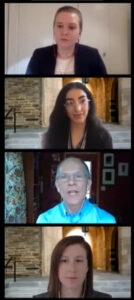This website uses cookies
We use cookies to ensure that we give you the best experience on our website. If you continue to use this site we will assume that you are happy with it.
“Will seeking medical care for COVID-19 affect my immigration status?”
“Will I be able to get a green card if I use food stamps?”
 These and many other questions were answered during a webinar on “Immigrants, Public Benefits, and COVID-19” presented by students and faculty from Cornell Law School’s 1L Immigration Law and Advocacy Clinic. Spring 2020 was the first semester of Cornell’s first clinical course for first-year law students, taught by Professor Jaclyn Kelley-Widmer. In addition to handling case work for individual clients, clinic students are charged with delivering a presentation to educate the public about an immigration issue.
These and many other questions were answered during a webinar on “Immigrants, Public Benefits, and COVID-19” presented by students and faculty from Cornell Law School’s 1L Immigration Law and Advocacy Clinic. Spring 2020 was the first semester of Cornell’s first clinical course for first-year law students, taught by Professor Jaclyn Kelley-Widmer. In addition to handling case work for individual clients, clinic students are charged with delivering a presentation to educate the public about an immigration issue.
Students Sarah DeYoung ’22 and Camilah Hamideh ’22 were assigned the task of presenting on the new “public charge rule,” often referred to as a “wealth test,” that took effect at the end of February 2020. The rule creates strict guidelines for whether an applicant can receive a green card in light of any past or possible future use of public benefits. Professor Stephen Yale-Loehr, along with Kelley-Widmer, were also part of the presentation panel. Partnering with several Cornell departments, such as the Cornell office that handles international student issues, as well as with Catholic Charities of Tompkins/Tioga Counties, which also serves many international students, DeYoung and Hamideh originally planned to present to a live audience of about thirty to fifty Cornell community members. They had done the research, created the slides, and practiced the presentation. But just days before it was scheduled to occur, COVID-19 caused abrupt closures and a massive reshuffling. The presentation was postponed a month and set up as a webinar instead of a local event.
In light of the new format, and the fact that the presentation covered an issue that applies to immigrants across the country, the team decided to open the webinar to a nationwide audience. Yet, as the situation with COVID-19 rapidly developed and began to have a major impact on immigrant communities, the webinar also needed to expand in content to cover more than just the public charge rule. Camilah and Sarah dove into research, educating themselves on additional complex legal issues such as the requirements for unemployment insurance and policies around immigration enforcement in sensitive settings such as hospitals. They synthesized a huge amount of information and condensed it into slides using language that would be easy for the audience to understand. In addition, they created numerous handouts to accompany the presentation, which included public charge rule basics and FAQs around immigration and COVID-19.
On April 13, over 1,000 attendees tuned into the webinar from around the country. Lawyers, social workers, human resources professionals, paralegals, and impacted immigrants were among the audience members. DeYoung and Hamideh led the presentation, which went very smoothly. The students clearly and articulately explained the nuances of the public charge rule, including its interplay with COVID-19. Questions streamed in throughout the presentation, which mostly matched those listed on the FAQ document the students had prepared. Anticipating the questions, the students easily addressed them during the Q&A session at the end of the presentation.
After the event, dozens of emails flooded Kelley-Widmer’s inbox, all of a theme: “That webinar was so helpful! Can I get the recording and the materials? Can I share the links with my colleagues?” (Of course, these materials are publicly available here.) Next steps include translating more of the resources into Spanish and delivering a version of the presentation in Spanish to more directly reach impacted communities.
Kelly-Widmer says that everyone involved in the 1L Immigration Law and Advocacy Clinic is thrilled they could deliver such a meaningful presentation, bringing critical legal information to a diverse audience during this tumultuous time.